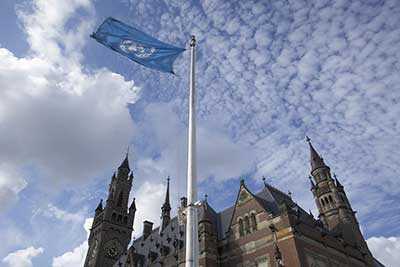Date: 02/03/2023
Relevance: GS-2: Important International institutions, agencies and fora- their structure, mandate.
Key Phrases: UN General Assembly, International Court of Justice, UNFCCC, Kyoto Protocol, Paris Agreement, Small Island Developing States, Customary International Law, COP-27, ITLOS.
Context:
- At the United Nations (UN), sixteen nations have launched a valiant effort to combat climate change, an existential threat to human civilization.
- The group, led by Vanuatu, an island nation in the South Pacific Ocean, seeks an advisory opinion on the issue of climate change from the International Court of Justice.
Jurisdictions of ICJ:
- The International Court of Justice (ICJ) has two types of
jurisdictions: Contentious and Advisory.
- Contentious jurisdiction involves settling legal disputes between states that have consented to its authority.
- On the other hand, advisory jurisdiction allows the United Nations General Assembly (UNGA), the Security Council (SC), and other specialized bodies to seek the ICJ's input on legal questions.
- While ICJ's advisory opinions lack binding force, they possess normative significance and provide clarity on relevant issues of international law.
- Additionally, the ICJ's advisory opinion on climate change could prove useful in domestic litigation pertaining to climate change.
Vanuatu’s Initiative:
- Despite multiple international legal frameworks on climate
change, such as the Paris Agreement and Kyoto Protocol, the global community
has not effectively addressed the issue.
- The presence of these frameworks has not resulted in concrete solutions to the problem of climate change.
- The 27th UN Climate Change Conference (COP-27) recently concluded
with little progress made on crucial issues like greenhouse gas emissions
reduction.
- The conference serves as an example of the international community's failure to take unified action on climate change.
- Vanuatu, a Small Island Developing (SID) state, launched an
initiative in September 2021 to seek an advisory opinion from the ICJ
through the UNGA.
- The initiative aims to clarify the legal obligations of all countries to prevent and redress the adverse effects of climate change, and it has gained support from over 100 countries.
Seeking Answers:
- The draft resolution piloted by Vanuatu poses the following questions to the ICJ.
- Firstly, what are the international legal obligations of
countries regarding the protection of the climate system from anthropogenic
emissions of greenhouse gases for present and future generations?
- The ICJ is expected to interpret and clarify existing international climate change law enshrined in various international environmental treaties, as well as use general and customary international law (CIL) to fill gaps in these treaties.
- Therefore, the ICJ could apply the 'no-harm' principle - which obligates states to ensure that activities within their jurisdiction do not harm other countries - to clarify ambiguous provisions of the Paris Agreement.
- Secondly, what are the legal consequences for states that have
caused significant harm to the climate system, SID states, and future
generations?
- This question aims to determine the consequences that states should face for not fulfilling their international legal obligations on climate change, including the possibility of climate reparations.
- During COP-27, an agreement was reached to create a "loss and damage"
fund to provide financial assistance to vulnerable developing nations.
- However, there is limited information on which countries will contribute to the fund. Additionally, the connection between funding and the historical responsibility of developed countries for emissions remains uncertain.
- In this regard, the ICJ's response to the second question could potentially clarify the legal principles that could aid in the implementation of the "loss and damage" fund.
Role of ITLOS:
- It is not just the ICJ whose advisory opinion is being sought.
- The Commission of Small Island States on Climate Change and International Law, which includes countries such as Antigua and Barbuda and Tuvalu, has requested an advisory opinion from the International Tribunal for the Law of the Sea (ITLOS).
- ITLOS has been asked to determine the obligations of countries
under the United Nations Convention on the Law of the Sea regarding
preventing, controlling, and reducing pollution of the marine environment.
- The challenges of ocean warming, sea level rise, and ocean acidification are all interconnected with the marine environment.
Conclusion:
- While the advisory opinions from ICJ and ITLOS are not a complete
solution, they can be a valuable tool in the fight against climate
change.
- However, the outcome of the verdicts may have positive or negative consequences.
- Nevertheless, it is essential to welcome the involvement of international courts as part of a multi-faceted strategy to protect the planet. Developed countries and groups such as the G-20 should support these initiatives by the SID states.
- The G-20, with its focus on environmental and climate sustainability, should take the lead, and as the current G-20 president, India should play a pivotal role in promoting sustainable lifestyle practices through their LiFE campaign.
Source: The Hindu
Mains Question:
Q. Recently, Vanuatu, an island nation in the South Pacific Ocean, sought an advisory opinion on the issue of climate change from the International Court of Justice. How can it become a valuable tool in the fight against climate change? Discuss (250 words).







